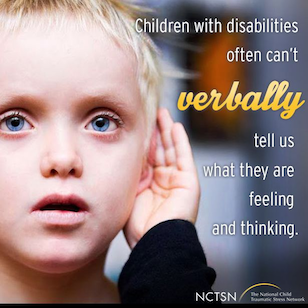Trauma and Mental Health in students with ID / DD
August 20, 2018
Tiffany Williams, LMSW
CTD Developmental Disabilities Policy Fellow*

On May 10, 2018, Governor Greg Abbott established Children’s Mental Health Awareness Day. Shortly after, he released a plan to prevent school violence, which included increasing mental health supports. Still, in the aftermaths of Hurricane Harvey and numerous school shootings this year, students are experiencing higher levels of stress and trauma in their day to day lives. It is crucial, now more than ever, that our youth are equipped with healthy coping skills so they can be successful in school. As awareness of the effects of trauma grows, we must ensure that these efforts include youth with intellectual and/ or development disabilities (ID / DD). This group has an increased risk of experiencing mental health issues, particularly trauma.
According to the National Child Traumatic Stress Network, youth with ID / DD are:
- 2x more likely to experience abuse, emotional neglect, and bullying.
- 3x more likely to be in families with domestic violence.
- 4x more likely to be victims of crime.
We know through research that if trauma goes untreated, there is an increased risk for further developmental delay. In light of the data, how can we equip our youth with ID / DD with the tools necessary to cope with trauma and stress? Since most students in special education spend most of their day in school, school may be an ideal environment for identifying signs of mental health issues and referring them to treatment.
The US Department of Education has already recognized that thousands of students in Texas have been denied special education services altogether. CTD strongly recommends that Texas takes a stand to protect services for students in special education. We must prevent further delay in their development, which impedes their future independence. Studies show that early identification and treatment of mental health issues lead to a greater chance of graduation and employment and less dependence on costly state programs. If we invest in preventative measures and early identification, we can reduce hospitalizations and institutionalizations of our youth with ID / DD.
 It is time for Texas to invest in prevention measures and leverage our schools to identify the indicators of mental health issues. We can do this by equipping special education professionals with the tools to view behavior as communication. Often, educators translate challenging behavior as a student being defiant, or they attribute it to the disability. In order to manage their classroom, these students are often sent to ISS (in school suspension), instead of getting positive behavioral supports or mental health services.
It is time for Texas to invest in prevention measures and leverage our schools to identify the indicators of mental health issues. We can do this by equipping special education professionals with the tools to view behavior as communication. Often, educators translate challenging behavior as a student being defiant, or they attribute it to the disability. In order to manage their classroom, these students are often sent to ISS (in school suspension), instead of getting positive behavioral supports or mental health services.
This preventative measure would require stronger collaborations between the Texas Education Agency and Health and Human Services. Fortunately, these two agencies have started to break from their silos by offering trainings to educators hosted by the Office of Disability Prevention for Children. This agency offers a free training, Road to Recovery, which was developed by the Hogg foundation and National Child Traumatic Stress Network. This training was provided statewide by staff from the SAFE Disability Services program and the Texas Center for Disability Studies. In it, educators are provided helpful tools to recognize trauma and mental health issues amongst students with ID / DD. ODPC and SAFE have offered Road to Recovery to 17 Educational Service Centers in Texas, and is continually adding new dates. In light of the traumas that our youth are exposed to through disasters or even their home life, Texas cannot afford to ignore the mental health of our future generations.
--
 *Financial Support for the CTD Developmental Disabilities Policy Fellowship is provided by the Texas Council for Developmental Disabilities, with Federal funds* made available by the United States Department of Health and Human Services, Administration on Developmental Disabilities. *$67,500 (79%) DD funds; $17,947 (21%) non-federal resources.
*Financial Support for the CTD Developmental Disabilities Policy Fellowship is provided by the Texas Council for Developmental Disabilities, with Federal funds* made available by the United States Department of Health and Human Services, Administration on Developmental Disabilities. *$67,500 (79%) DD funds; $17,947 (21%) non-federal resources.
< Last in Our Issues: Improving Safety for All Texas Students: Guiding Principles
Next in Our Issues: The Flavor of the 86th Texas Legislature >


